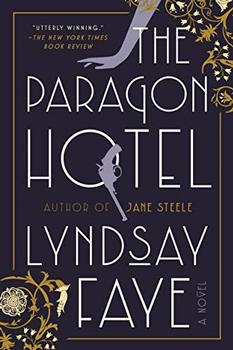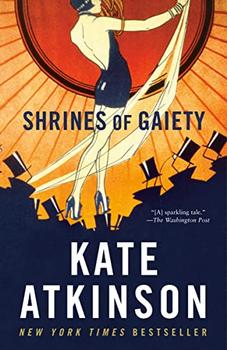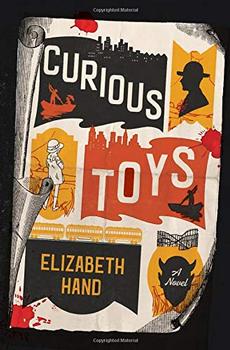Summary | Excerpt | Reading Guide | Reviews | Beyond the book | Read-Alikes | Genres & Themes | Author Bio

Lyndsay Faye's arresting The Paragon Hotel focuses on how disparate groups of marginalized people cope in a country founded on the idealistic goal of equal opportunity for all. Her novel is engaging on so many levels that its multiple themes beg us to stop and reflect at frequent intervals, even as the narrative drives us to keep reading.
Born into abject poverty in the Little Italy neighborhood in Harlem, New York City in 1896, Alice James learns early on how to stay out of harm's way. A white woman and daughter of a Welsh-American prostitute and a deceased Italian lothario, Alice ("nobody" as she refers to herself) possesses little if any formal education but is long on street smarts. And she will need all the smarts – to say nothing of luck – she can muster if she's to live to see her next birthday.
As her narrative begins, it's 1921 and Alice is nursing a fresh bullet wound. She's carrying a satchel with $10,000 in counterfeit money on a Pullman train bound for Portland, Oregon. Just about as far from Harlem as possible, it seems as good a place as any. Right now, destination is secondary to the simple act of running. Once there? Who knows?
As fortune would have it, George, a Black Pullman porter who has seen his share of WWI violence (See Beyond the Book), is savvy to Alice's wounded plight. Once they reach Portland's Union Station, he offers to help her as best he can, given he's not allowed to touch a white woman. George, whose given name is Max, steers Alice to the Paragon Hotel where a Black physician named Dr. Pendleton tends to her wound.
When she awakens, Alice finds her attendant is a woman named Blossom Fontaine who is "dark, dark as any African." Not that it concerns Alice, but "these things matter in places where we've dumped pink, white, yellow, red, black people into the same paint can." Apparently in Blossom's thrall she also notices that the woman's skin, "is burnished, as if she's aglow," and that her "lips and eyes are delicate, pretty watercolor shades of peach and umber." Her face is architectural, as "If you left a Grecian temple alone for around thirty-five years…that would be Blossom." Blossom is a rather famous chanteuse with singing credits that include such locations as Chicago, San Francisco, Paris and Portland, and the two women bond immediately.
It turns out that Alice is a Mafia gun moll, who has fled New York as a not-so-innocent victim wounded in a blaze of gunfire, and may be in serious peril from a crime "family." It's a situation that started easily enough as Alice reveals via alternating chapters chronicling her personal history. It is also a situation that makes leaving the Paragon Hotel potentially risky. She can't know for certain whether she was followed or not. Back in Harlem, the marginalized Italian community and, specifically, its warring factions of criminal "families" seemed as if their reach was as long as it was deadly.
Many historical novelists skip the critical detail of writing dialogue that feels authentic to the period. Not Lyndsay Faye. I admit it does take time to get used to the tone and idioms of the era, but Faye pulls off the blended Italian/English vernacular of Little Italy. Additionally, she portrays the subtle sound and rhythm of Black American patois without the artificial exaggeration some authors fall prey to.
Furthermore, Faye juggles the dual story arcs – Alice in Harlem laying the groundwork for Alice in Portland – superbly. In both locales, Alice must be quick to adapt to her surroundings. But in Portland she's found a niche where her talents for blending into multiple worlds – white and Black – and tenacity are put to use. When a Black child goes missing from the hotel, Alice refuses to give up the search even in the face of a threat from Oregon's ferocious Ku Klux Klan. In the end, secrets are exposed, plotlines twist this way, then that, and it all draws down toward perhaps the best resolution possible given the era.
![]() This review was originally published in The BookBrowse Review in February 2019, and has been updated for the
January 2020 edition.
Click here to go to this issue.
This review was originally published in The BookBrowse Review in February 2019, and has been updated for the
January 2020 edition.
Click here to go to this issue.

If you liked The Paragon Hotel, try these:

by Kate Atkinson
Published 2023
The #1 national bestselling, award-winning author of Life after Life transports us to a restless London in the wake of the Great War--a city fizzing with money, glamour, and corruption--in this spellbinding tale of seduction and betrayal

by Elizabeth Hand
Published 2020
An intrepid young woman stalks a murderer through turn-of-the-century Chicago in "this rich, spooky, and atmospheric thriller that will appeal to fans of Henry Darger and Erik Larson alike" (Sarah McCarry).
Your guide toexceptional books
BookBrowse seeks out and recommends the best in contemporary fiction and nonfiction—books that not only engage and entertain but also deepen our understanding of ourselves and the world around us.